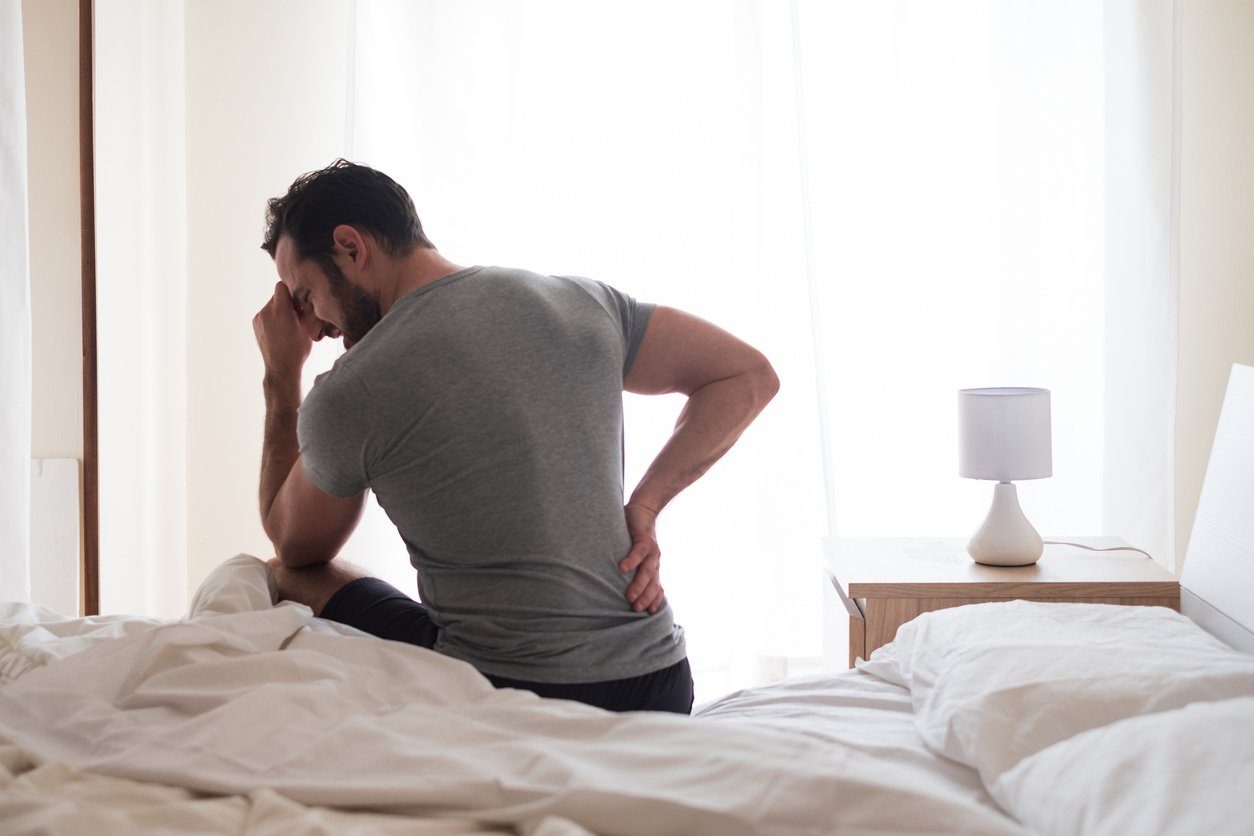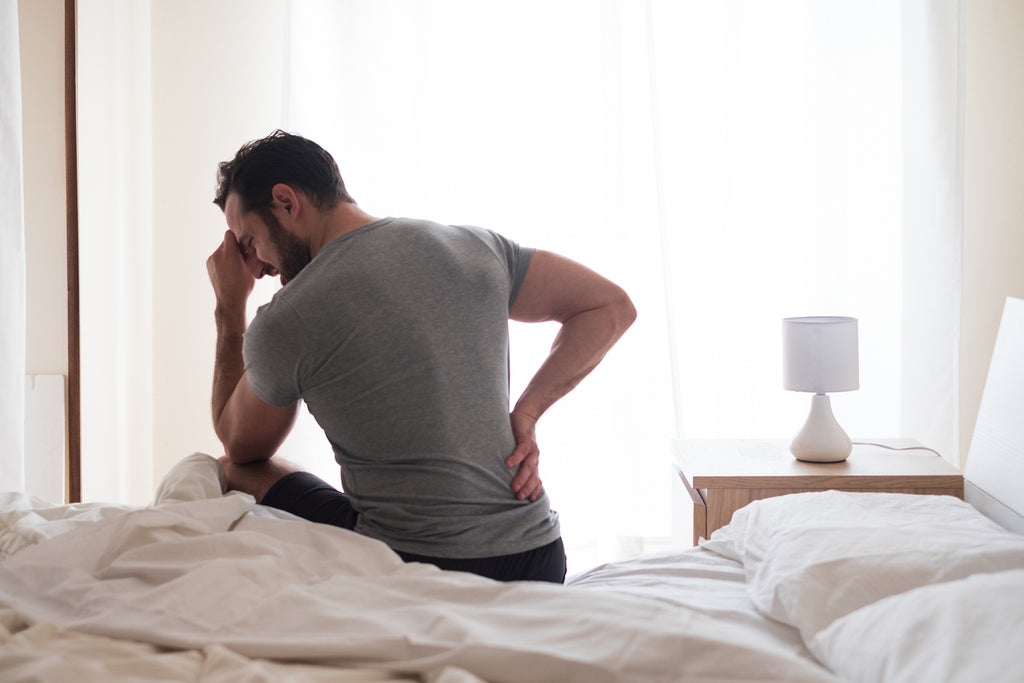Is My Mattress Making My Back Hurt?


According to statistics compiled by the American Chiropractic Association, experts estimate that up to 80% of the population will experience back pain at some time in their lives. That is a staggering percentage, one that explains why back pain is the top reason cited when people miss a day of work.
In many cases, back pain can be traced to a definite cause. Sufferers may have experienced an accident or been diagnosed with a medical condition such as scoliosis or osteoporosis. They might have jobs requiring them to sit for hours behind a steering wheel or hunch over a keyboard in a cramped cubicle.
In other cases, the symptoms may have come on gradually and have no immediately discernible cause. One day, you mind your own business, and the next, you're shifting uneasily in your seat, wondering when being a human became so uncomfortable.
Before discussing whether or not your mattress might be the culprit in causing (or exacerbating) your back pain, we must first discuss the levels of intensity sufferers experience and consider whether more drastic measures should be taken.
When to See a Doctor
As we mentioned above, most incidences of back pain have an apparent cause and can be treated at home with rest and simple home care remedies. Depending on your particular pain, you may find relief through rest, stretching, or simple home remedies.
Such is not always the case, however. Some people suffer significant, debilitating back pain, and need serious medical attention.
Of course, we all have different perceptions when it comes to rating our pain. That's why our friends over at the Mayo Clinic have this to say about how to know when the time has come to seek a doctor's help:
In rare cases, back pain can signal a serious medical problem. Seek immediate care if your back pain:
- Causes new bowel or bladder problems
- Is accompanied by fever
- Follows a fall, blow to your back or other injury
Contact a doctor if your back pain:
- Is severe and doesn't improve with rest
- Spreads down one or both legs, especially if the pain extends below the knee
- Causes weakness, numbness or tingling in one or both legs
- Is accompanied by unexplained weight loss
If none of these symptoms apply to you, then a doctor's help is probably not immediately needed for your back pain.
That doesn't mean what's happening to you doesn't matter, or that your pain is somehow not valid.
It does mean that you have options in dealing with your pain that may not require a doctor's appointment.
If you're curious, read on.
How to Investigate Root Causes
The causes behind back pain are so numerous that time would fail us to list them all. Significant contributors are sports and on-the-job injuries, poor posture, degenerative conditions, and weak muscles. Think about where you spend the majority of your time (and in what position!), and then consider the times of day when your back seems to be the least comfortable. Often there's an undeniable link between your behaviors and your back pain.
In our hyperconnected internet age, tablet and cellphone use are now contributing factors in people developing neck and upper back pain. Because people engaging with their devices are tilting their heads down and rolling their shoulders forward for hours every day, they're putting new pressure and strain on the cervical spine. Over time, this can lead from general aches to chronic conditions.
Lessening Symptoms
When we're hurting, the last thing most of us want to do is get up and move around. Unfortunately, that's usually what we need to do. Although it sounds somewhat counterintuitive, exercise and physical activity can often lessen back pain.
Whether it's gentle exercises intended to stretch and loosen the back or moderate weight lifting designed to strengthen back muscles and thereby take some strain off your spine, working out is often precisely what the doctor orders. (And we don't mean that as just a figure of speech: If you're considering exercise to lessen your symptoms, it's probably a good idea to check in with your general practitioner before making significant changes.)
If you're going to exercise well, you'll also want to sleep well. Unfortunately, that's not always easy for people suffering from back pain. There are few things in this life worse than feeling dreadfully tired, yet finding yourself unable to fall asleep due to pain.
That's where we come in.
Could Your Mattress Be at Fault?
Sometimes the most straightforward solutions to our problems are right under our noses. Or, as the case may be, right under our backs.
That's right. When it comes to back pain, your mattress might be the culprit.
One of the best ways to determine if your mattress is the culprit is to think about when your back pain most occurs. If you wake up in pain and your pain goes away within about a half an hour of light to moderate activity, that's a significant clue.
Also, the age and condition of the mattress must be taken into consideration. If your mattress is more than ten years old, or if it's suffered excessive wear-and-tear, the chances are high that it's at the very least contributing to your pain issues.
With everything else going on in your life, replacing your mattress might not be high on your to-do list; however, if doing so would lessen the amount of pain you're suffering daily, wouldn't it be something well worth considering?
The good news is that we're here to help.
We Can Help
Here at Nest Bedding, we are committed to helping you get the best possible night's sleep every time. We provide you with the highest quality mattresses at the lowest reasonable prices.
If you suspect that an old or damaged mattress might be a root cause in why your back has been hurting, feel free to contact us at any time.
If you're able, please stop by one of our local showrooms to see what we have in stock. You can try our products out first-hand and chat with our experienced staff, who are friendly without being pushy.
We look forward to serving you soon.




